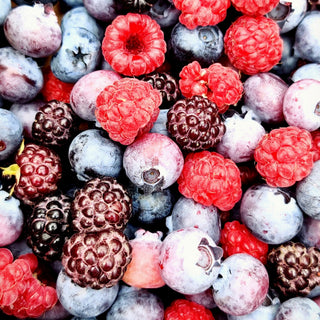We all know that fruit is good for us. We also understand there are some people who have fructose (naturally occurring sugar in fruit) issues, but for the majority of us, fruit is a healthy and delicious addition to our diets. Fruit is relatively low in kilojoules and packs a powerful nutrition punch. Fruit is rich in dietary fibre, even more so if we eat the skin, and contains a myriad of vitamins like Vitamin C, beta carotene (a precursor to Vitamin A), folate, as well as important minerals like potassium and magnesium. Fruits, like vegetables, are a great source of phytonutrients, the protective chemicals in certain plant foods that promise us better health. When we eat seasonal fresh fruit or drink a freshly pressed fruit juice, we feel renewed, refreshed and ‘feel clean’. I hope you know what I mean, it’s like when you’re lying low with a head cold... runny nose, watery eyes, dry mouth because you can’t breathe through your blocked nose and someone kindly offers you a freshly squeezed orange juice…how good is it? It’s almost as if your body is crying out for Vitamin C, which we know won’t get rid of a cold or even prevent it but it will help to reduce the severity of the symptoms. It’s interesting that so many of the fruits rich in Vitamin C, like citrus fruits and kiwifruit, are winter fruits. It’s nature at work giving us what we need when we need it.
So How Much Fruit Do We Need Each Day?
The Australian Guide to Healthy Eating recommends that everyone over the age of 9 should be eating a minimum of 2 serves of fruit a day. Ideally we should be eating rainbows, by choosing an array of colourful fruits to ensure we a getting a mix of the phytonutrients with high antioxidant activity. One serve = 1 medium apple, banana, orange or pear, 2 small kiwifruit, apricots or plums or 1 cup diced or canned fruit (no added sugar) or occasionally 125ml fruit juice (no added sugar) or 30g dried fruit eg 4 apricot halves or 1 heaped tablespoon sultanas
Are We Getting Enough Fruit?
No, most of us are not eating enough fruit. According to the latest Australian Health Survey 2013 only 54% of Australians eat 2 serves of fruit a day. Young adult males are the least likely to eat fruit with only 45% of males aged 14-18 years eating fruit and only 39% of 19 -30 year old males eating fruit on a daily basis. Whenever I have asked young men why they don’t eat fruit regularly, they simply say that it doesn’t fill them. They may eat a banana on their breakfast cereal but would rather have other foods as snacks. Women are better fruit eaters than men but the best fruit eaters in Australia are young children- 80% eating fruit every day.
What is the Favourite Fruit of Australians?
According to the latest ABS nutrition survey, we like apples the best. 23% rated apples no. 1, followed by bananas 18%, then mandarins, oranges, berries, peaches and nectarines at 4.7%. I was surprised not to see more fruits rating more highly in the popularity stakes like kiwifruit, passionfruit, avocado, pineapple, mangoes, melons and grapes.
My Top Five Fruits - and Why…
Kiwifruit both Green and Gold because eating two to three kiwifruit per day thins the blood as effectively as aspirin. Gold Kiwifruit is high in lutein which helps protect the eyes against macular degeneration the leading cause of blindness in people over 50. Berries, especially blueberries - nicknamed brain berries because their deep blue pigment proves that they are good sources of anthocyanins which act as antioxidants and may help protect the brain against premature ageing and cognitive decline. Citrus fruit -oranges, limes, lemons because they are not only wonderful sources of Vitamin C but are also high in polyphenols, coumarins and terpenes which appear to have anti-inflammatory effects and may be beneficial for the heart and other inflammatory conditions like arthritis. Cherries because they are a natural source of melatonin, a neuro-hormone that has long been linked to sleep. According to the latest findings, have a serve of cherries (1 serve = ½ cup dried cherries or 1 cup fresh cherries), one hour before your desired sleep time and you’ll be sleeping like a cherry, cherry baby! Avocados because the healthy fats in avocados can actually improve the body's ability to absorb nutrients from foods, in particular the fat-soluble vitamins and phyto-nutrients. A study published in the American Journal of Clinical Nutrition by Dr Steven Schwartz has shown that adding about half an avocado (75 grams) to a carrot/lettuce/spinach salad increases the absorption of the fat soluble, antioxidant nutrients from 4 to 13 times compared with the absorption rate of the same salad without avocado. Article written by Karen Inge


